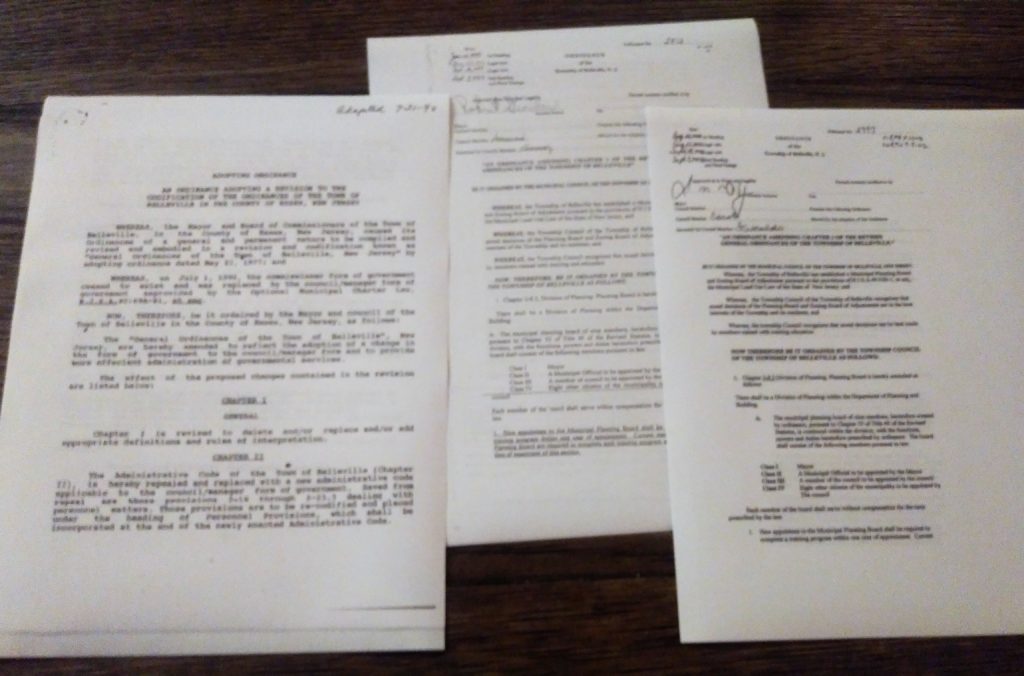
Editor’s Note: The next Town Council meeting is scheduled for Tuesday, June 9th 2020 at 6 p.m. Members of the public can e-mail their questions or comments to Township Clerk Kelly Cavanagh at kcavanagh@bellevillenj.org by 6 p.m. on June 9th. We suggest that you put “Healthcare ordinance” or “Planning Board ordinance” as the subject line if you’re commenting on the ordinances discussed. Also, send in your other questions and comments for general public comment on whatever you’d like to discuss with the Mayor and Council.
This article is long, but it’s worth your time, and time is short.
Two ordinances – one concerning healthcare for some elected officials and another concerning the Planning and Zoning boards — will be considered for final adoption at the upcoming Town Council meeting on Tuesday, June 9th. Mayor Michael Melham would have Belleville residents believe these are innocent and routine ordinances, but if you take a deeper look, there might be more than meets the eye.
The healthcare ordinance, on its face, seems to seek to remove language from the Township’s healthcare ordinance which bans any elected Belleville official, sworn in after June 30, 2010, from being eligible for Township health insurance. The Planning Board ordinance, if taken at face value, looks as if it seeks to abolish the planning and zoning boards entirely. Both ordinances were introduced at the May 26th, 2020 Town Council meeting, with First Ward Councilwoman Marie Strumolo-Burke and 4th Ward Councilman John Notari voting no to introduce the healthcare ordinance, and 2nd Ward Councilman Steve Rovell and Burke voting no to introduce the Planning Board ordinance.
Ordinances must go through a process of being introduced by majority vote (a “first reading”) at one Town Council meeting and then a second “reading” – traditionally at the next scheduled Town Council meeting. The second reading must include a public hearing during which persons give comments or ask questions on the ordinance (whether or not those questions are answered or comments heard is an entirely different matter) and then the Council holds a final vote to adopt the ordinance.
A few days prior to the May 26th meeting, we posted the ordinances on the Belleville Watch Facebook page, encouraging residents to e-mail questions and comments to the Township Clerk about them, so they could be read at the meeting. Other social media users did the same, and a few residents did indeed send in e-mails.
After the introductory votes were taken on the ordinances, Melham explained that they were “basic clean-up ordinances” and that they would be explained later in the meeting. Within minutes, Melham’s customary insolence and arrogance multiplied tenfold as Township Clerk Kelly Cavanagh read e-mails sent in to her for public comment.
Melham huffily stated that “clean-up ordinances” are designed simply to remove inconsistent ordinances, redundant ordinances and ones the Township can’t enforce. He said the ordinances were designed to put things in order in the runup to the Council’s July 1st reorganization meeting, when new board appointments will be made and “we’ll have things in working order.” He stressed that the ordinances would not affect the budget and vehemently denied that the council was seeking to expand healthcare, or to abolish the planning or zoning boards.
There may be much more to the “clean-up ordinances” Mayor Michael Melham is trying to sell to Belleville as the Town Council’s version of “Nothing To See Here.”
Planning Board “Clean-Up” Ordinance

So, first, the Planning and Zoning Board ordinance. Melham claims that because information related to the Planning/Zoning Board exists in two places: Chapter 2, Section 8 and Chapter 19. Melham defends the “clean-up ordinance” by stating the Township doesn’t have a Planning Department or a Planning Director and that the ordinance targeted by the “clean-up” ordinance states that 8 Class IV members would serve on a nine-member board.
It would have been more logical (and simpler, and wouldn’t have led to the many resident questions and comments Melham seems annoyed by) to simply remove any mention of a Planning Department and a Planning Director from the ordinance, and correct what was obviously a typographical error, instead of removing an entire segment. But doing so would impede Melham’s apparent need to control things that can advance his agenda of turning Belleville into “Hoboken on the Passaic.”
Chapter 19, as it appears in the Township Code and on the Planning Board website, allows the mayor to appoint the lion’s share of Planning Board members. The language of Chapter 19 miraculously appeared on the Planning Board website in the early part of summer 2019 and the same language can now be seen in the Township Code. The Chapter 19 language reflects verbatim a 1977 Planning Board ordinance, when Belleville operated under a commission form of government – a form abolished in its entirety in 1990 by Belleville voters.
A 1990 ordinance, passed by the town council when the form of government changed to the current weak mayor, council/manager form of government, basically rendered null-and-void all ordinances passed under the commission form of government that could not readily translate to the new form. In 1999 and 2003, ordinances were adopted (among those voting “yes” on the 2003 ordinance was — gasp! — then 4th Ward Councilman Michael Melham!)
Along with all of this, the Chapter 19 ordinance flies in the face of state law, which states that in a council-manager form of government, the mayor can appoint two members, and the others must be appointed by vote of the town council. Since at least the beginning of 2019, the mayor has insisted he has the right to appoint most Planning Board members, despite being shown the ordinances. As Melham mentioned at the May 26th meeting that “new board appointments” would occur at the July 1st reorganization meeting, could this be what he means to have things “in working order?”
The Healthcare “Clean-Up” Ordinance.
Looking at the healthcare ordinance, Melham once again claims it’s an innocent “clean-up ordinance” with no ill-intent. He referred to, on record, a 2016 resolution that was apparently designed to remove the 2010 ordinance change barring certain elected officials from obtaining Township healthcare benefits. Melham seemed to argue that because the mayor and town council under the Kimble administration (four of whom still occupy ward council seats today) unanimously voted for that resolution – and ostensibly changed the ordinance — that the clean-up ordinance wasn’t making any changes.
It’s true the Town Council, at its June 30, 2016 reorganization meeting, unanimously voted to approve that resolution. However, there is a glaring problem with that resolution, one that even the learned (albeit smug) Township Attorney Stephen Martino noted: a resolution cannot be used to change or repeal an ordinance; a new ordinance to repeal an ordinance must be adopted through the process of having two readings, a public hearing and a final vote. Therefore, the 2016 resolution was at best improper and thus could not have repealed the 2010 ordinance.
(If you would like more information on this, Lee “Griff” Dorry, founder of Belleville Watch’s parent site Essex Watch, wrote an exhaustive exposé on the resolution, specifically how it related to the controversial former councilman Joe Longo.)
So, what both Melham and Martino at the May 26th meeting seemed to say to Belleville residents was simply, “The previous administration messed up by trying to change the ordinance through improper means to give all elected officials healthcare benefits, so now we’re just correctly codifying the whole mess by making it truly an ordinance.”
Yes, it appears at least the majority of Town Council members have no problem with elected officials obtaining healthcare benefits at taxpayers’ expense (both the mayor and the township attorney admitted that many elected officials do get healthcare benefits,) an attitude especially egregious in a time when many Belleville residents have been laid off from or have lost their jobs, have lost their health insurance and sit up at night wondering if they can keep their head above water with the amount of property taxes they pay.
This “clean-up” ordinance could have been a great opportunity to demonstrate leadership by perhaps creating a new ordinance to bar all members of the Town Council from taking healthcare benefits. But what can we expect from “Mayor Missed Opportunity?”
Putting It All Together: Through the Looking Glass
These “clean-up ordinances” may not be nearly as innocent as the mayor would like Belleville residents to believe.
It seems strange that some councilmembers voted “no” on introducing these ordinances. The second and final adoption vote after a public hearing is the one that truly matters, but “no” votes on introduction are rare. Maybe, just maybe, some councilmembers know something about these ordinances that others would rather Belleville residents not know.
Belleville residents could be forgiven for believing these ordinances are part of a power grab, or that councilmembers have no problem ensuring that they can properly continue to help themselves to taxpayer-funded benefits by codifying what was an improper ordinance change to begin with. At the very least, the ordinances appear to be akin to using a shotgun to do surgery when a scalpel would be more precise and less destructive.
Despite Melham’s irritable denials, these ordinances and their purposes are worth questioning. Please see the top of this article for information as to how to send in questions to the Township Council for the June 9th meeting.
Some councilpersons at the May 26th meeting took an unusual step by voting not to introduce these ordinances. The vote on June 9th for final adoption, however, is the vote that matters. Please tell the Town Council how you feel about these “clean-up” ordinances.
